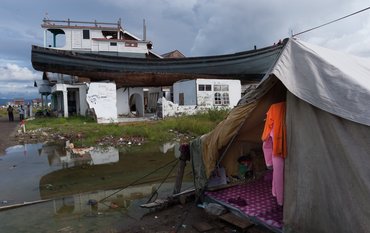Celebration of 20-year anniversary of the launch of the GRACE mission (with NASA-JPL DLR and GFZ) at the German Embassy in Washington: "Great scientific record" and future plans
The German Embassy in Washington, USA, has celebrated the 20th anniversary of the launch of the GRACE mission together with representatives of NASA, the German Aerospace Center DLR, the GFZ German Research Centre for Geosciences and the satellite manufacturer Airbus. GRACE stands for Gravity Recovery and Climate Experiment. The measurement principle implemented with twin satellites is the only method that can observe changes in the global water cycle even far below the Earth's surface. On March 17, 2002, the first two GRACE satellites were launched into space, where they recorded tiny changes in gravity for more than 15 years. Since May 2018, the follow-up mission GRACE-FO – the FO stands for Follow On – has continued the unique series of measurements.
"The event at the embassy was a double success," said Niels Hovius, acting scientific director of GFZ, after returning from the United States. "Not only did we look back on the great scientific record of the last 20 years," Hovius said, "but we also talked about the possible continuation of this important data series in five years at the latest. In view of the immense challenges of climate change, we in science, but also as a society, urgently need this continuity in Earth observation and especially of the global water cycle." In a so-called Phase A study, the project partners JPL (NASA´s Jet Propulsion Laboratory in Pasadena, USA), GFZ and DLR, together with Airbus, are currently investigating how such a second follow-up mission – the working title is GRACE-I – could be implemented. Two institutes of the Max Planck Society are also involved, one of which is planning to operate the ICARUS (International Cooperation for Animal Research Using Space) payload – a system that can be used to track animal migrations from space. In this way, for example, new insights could be gained into how changes in climate and in the water-balance affect animal habitats and behavior.
The data from the GRACE and GRACE-FO missions made it possible for the first time to precisely quantify the loss of ice mass from the large ice sheets on Greenland and Antarctica, as well as the course of droughts. Measurements of record Greenland ice loss in 2019 and drought years in 2018 and 2019 in Europe attracted particular attention. In central Europe, the drought of recent years resulted in a water deficit in summer 2019 that was twice the usual summer water deficit. With its measurement results, the GRACE/GRACE-FO mission contributes decisively to a better understanding of the Earth system and in particular the water cycle. In the latest report of the Intergovernmental Panel on Climate Change (IPCC), GRACE is the third most frequently mentioned satellite mission. The primary GRACE output “Terrestrial Water Storage” was recently defined by the Global Climate Observing System (GCOS) as an Essential Climate Variable.
Further information:
https://www.gfz-potsdam.de/en/press-public-relations/news/details/jubilaeum-20-jahre-grace-mission-mit-gaesten-aus-wisschenschaft-wirtschaft
https://www.gfz-potsdam.de/en/press-public-relations/news/details/happy-15th-birthday-grace











![[Translate to English:] [Translate to English:] Abror Gafurov von dem Schriftzug "Welcome to Azerbaijan" und den UN und COP Logos](/fileadmin/_processed_/2/5/csm_2024_11_Baku_COP29_Abror_Gafurov_1042faec82.jpeg)


![[Translate to English:] Martin Herold standing in front of the library on the Telegrafenberg](/fileadmin/_processed_/c/d/csm_Martin_Herold_d385ee4dd9.jpeg)
![[Translate to English:] Many people are listening to a presentation in the GFZ lecture hall.](/fileadmin/_processed_/c/a/csm_1_Bild1_hell_b9c0e9f5ed.jpeg)






![[Translate to English:] Both scientists sitting on stools in front of a wall of books in the Telegrafenberg library](/fileadmin/_processed_/6/6/csm_Buiter_Castell_DORA_4_e87cb1ea18.jpeg)
![[Translate to English:] Gruppenbild mit 4 Personen](/fileadmin/_processed_/8/d/csm_20241017_GFZ-Emmerman-Medal-005_web_reinhardtundsommer_21a414fa4a.jpeg)






![[Translate to English:] Ice landscape with five red tents](/fileadmin/_processed_/8/9/csm_Zeltlager_auf_dem_Eis_Urheberin_Jenine_McCutcheon_5ced2d523b.jpeg)

